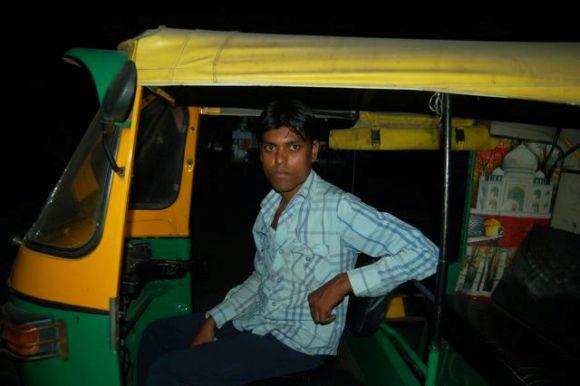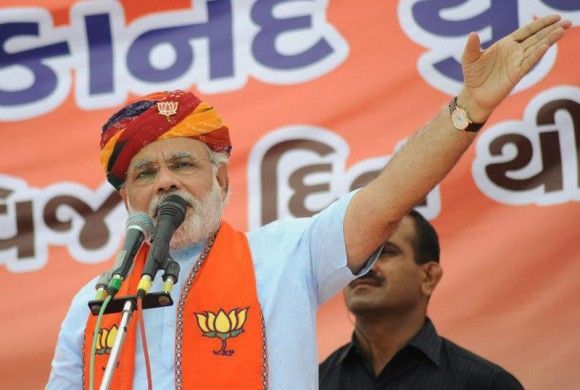 | « Back to article | Print this article |
'Taint will remain. But Modi is good for Gujarat's Muslims'
Can Gujarat Chief Minister Narendra Modi ever wash away the taint of the 2002 anti-Muslim riots? Prasanna D Zore spent five days in Ahmedabad meeting several Muslims across the socio-economic-caste divide, to find out what the community feels about Modi.
Whatever his critics say, Narendra Modi has succeeded in emerging as the darling of Ahmedabad's Muslims. Three Muslims -- two autorickshaw drivers and an overseas Indian citizen -- feel that they have managed to better their lives under his reign largely because Modi's iron hand over the state administration has prevented riots after March-April 2002, enabling them to go about their businesses without any worries.
"Amara maate Modij barobar chhe (For us Modi's the only right person)," says Asif Chhipa, 32, from Jamalpur, a Muslim ghetto in the walled city. Asif, who earns Rs 300 to Rs 400 every single day of the month, says, "Modina raaj ma dhamaal nath thati (In Modi's tenure we haven't witnessed any riots)."
Gujarat Election Coverage | Check out the Rediff forecast
"Look at this road," says Iqbal Bandh from Gomtipura, another Muslim locality, of a newly laid road near old Vadaj. "It wasn't motorable earlier (under the Congress regime). Now, I can ply on this road even after midnight," he adds. Iqbal was 13 when the post-Godhra riots broke out and many of his relatives lost their lives in the carnage.
Good roads (a symbol of how Modi is quickly developing Gujarat) and a riot-free atmosphere (symbolic of the peace one of the most controversial rulers in India has managed to bring to his state) are what Modi has consciously created to rid himself of the taint that he allegedly encouraged and looked the other way when Hindu mobs embarked on their acts of violence against the Muslims a decade back.
Please click on NEXT to read further...
'No Congress govt brought as much prosperity, development as Modi'
Through developmental programmes and Sadbhavna missions, Modi has successfully created a vested interest group -- a class that now comprises both Hindus and Muslims. "It is this vested interest group that will help Modi become India's prime minister one day," says Ayyub Pathan, whose brother Ashraf Pathan was among the scores of villagers who became overnight millionaires by selling their farmlands in Sanand taluka to Gujarat Industrial Developmet Corporation.
Ayyub, an OIC who stays a kissing distance away from Kanch Ki Masjid, says, "Whatever my political inclinations, whatever Modi is alleged to have done to Gujarat's Muslims, the fact is no Congress government in the last 40 years has managed to bring as much prosperity and development as he has."
In fact, both Asif and Iqbal reckon that because of Modi, Muslims in Gujarat have now started looking at education as an empowerment tool and are enrolling themselves in sizeable numbers in schools and colleges run by Muslim institutions as well as the government.
Asif, Iqbal and Pathan, three different individuals belonging to different economic strata, echo each other when they talk about Narendra Modi. All three strongly pitch that their friends too -- mostly from their neighbourhoods -- share their admiration for Narendra Modi.
The only point where Asif, Pathan and Iqbal differ is on how they look at Modi's post-Godhra riot taint.
Please click on NEXT to read further....
'Modi fulfills his promises to all six crore Gujaratis'
Asif was 22 when Gujarat burnt and he vividly remembers how Muslims in mixed localities were hounded out of their homes, some burnt, some maimed and some murdered in cold blood.
But Asif says he has gotten over those lurid times and believes that while Modi may be communal, now that he has gained power and fame, he will never let Gujarat burn again. "We feel secure in Modi's Gujarat," says Asif. "The situation now is such that nobody dares to play mischief with women in Gujarat, whatever be their religion."
Asif has two sisters, both married into his Chhipa community, a name these sections of Muslims gained because of their occupation of block printing.
Pathan admires Modi because, he says, "I have seen the difference in the administration offered by earlier Congress governments and now Modi. You can feel the difference. Modi fulfills his promise of development and security to all six crore Gujaratis."
Iqbal is the only one who thinks it will be almost impossible for Modi to rid himself of the taint of being a chief minister who let Gujarat burn for more than a week as he continued to look the other way.
"The taint will remain. How can we forget what this man has done to our community? But Modi's still good for Gujarati Muslims," he says.
It becomes difficult to decipher this paradox but Iqbal makes your task easy: "Most Gujarati Muslims of my age want progress. What matters is by the end of the day I earn Rs 400 and give it to my family. What else does one want?" he asks.
Asif, Pathan and Iqbal have used different words, different idioms and different dialects to say the same thing: Amara maate Modij barobar chhe.
That in a nutshell defines a new class of vested interests that Modi has so judiciously created and which benefits from 10 years of riot-free Gujarat and an opportunity to better their socio-economic status.


